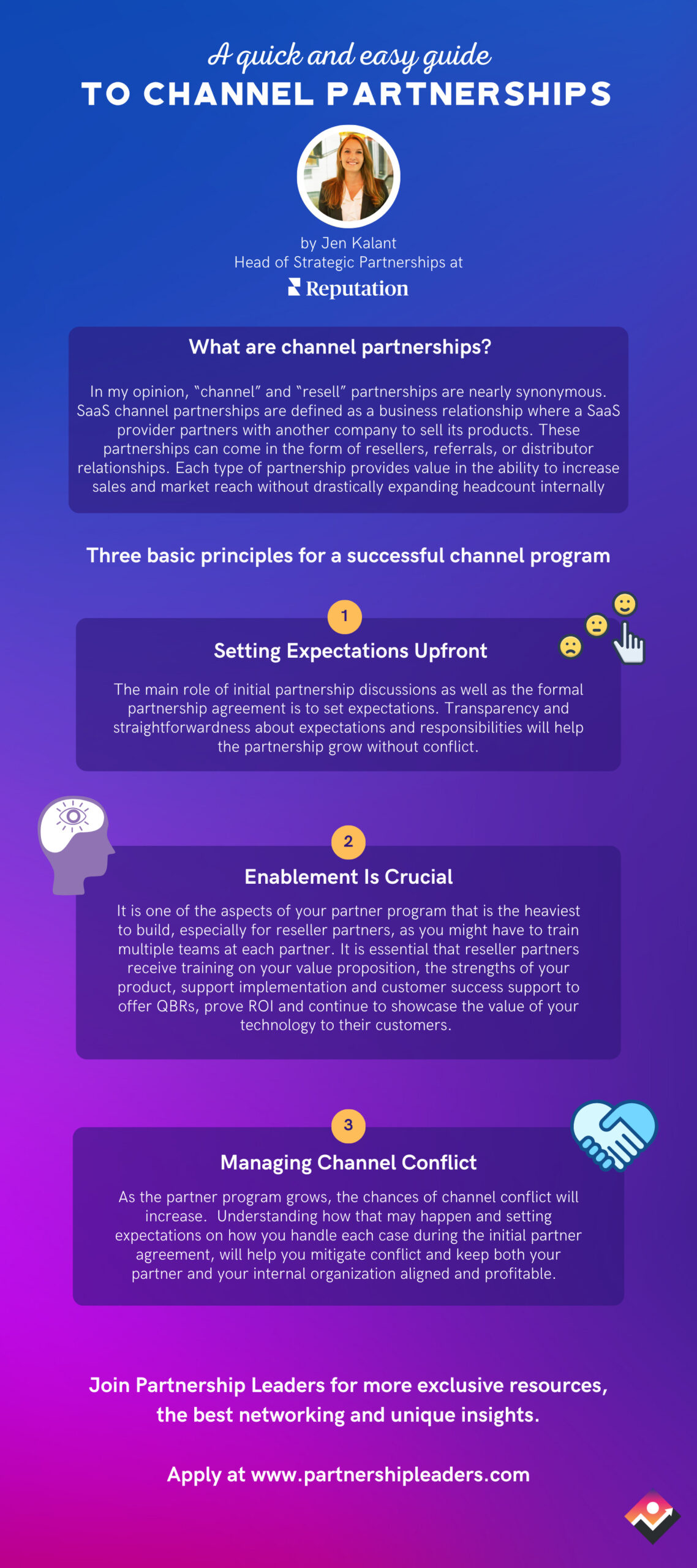Jen Kalant is the Head of Strategic Partnerships at Reputation. She built her SaaS career in the channel partnerships industry and has nearly ten years of experience building partner programs from the ground up. Jen has developed channel programs that enable partners to sell her companies’ SaaS solutions as an extension of their direct sales organizations. In this article, she will answer the question “What are channel partnerships?”. She will also give advice on how to build a successful channel and resell program.

What are channel partnerships?
For many people, when thinking about SaaS partnerships, they likely think of channel partnerships, since these relationships have been around for a long time. With the evolution of SaaS partnerships over the last several years, other people might think of technology and integration partnerships first. With the growth and permeation of SaaS partnerships and the proof of impact that partner teams can have, we have started seeing a holistic ecosystem mindset. The partnership industry has started to revolve around the impact that tech integrations, a network of co-sell relationships, and mutual referral partners can bring alongside resellers.
Is resell a synonym?
In my opinion, “channel” and “resell” partnerships are nearly synonymous. SaaS channel partnerships are defined as a business relationship where a SaaS provider partners with another company to sell its products. These partnerships can come in the form of resellers, referrals, or distributor relationships. Each type of partnership provides value in the ability to increase sales and market reach without drastically expanding headcount internally. As the current economy and outlook for the SaaS market shifts, SaaS channel partnerships will become increasingly important for partner teams to deliver revenue impact with limited resources.
From my personal experience, reseller partnerships can become a tremendous revenue source for SaaS companies. Reseller partnerships are business relationships where a partner resells the SaaS technology under its own brand. However, this doesn’t mean that resell partners are packaging and marketing your product in the same way. You might have resellers that are purely white labeling your technology, others who are packaging your technology and rolling it into bundles along with their own technology and others with their own service offering alongside your technology. Some reseller partners are transparent with what technology is behind the scenes, while others want to offer a seamless, on-brand experience as if it was their own internal solution.
Reseller vs Vendor
SaaS channel partnerships have evolved since I started my career in partnerships nearly ten years ago. One of the largest changes I’ve noticed is that the industry has stopped confusing resellers with vendors. The main difference between these two concepts lies in the nature of the relationship and the effort to build it and support it. In the early days of SaaS reseller relationships, a lot of agencies would treat the partnership as a vendorship, where the technology was available if and when there was a client need.
With successful partnerships, both entities work together, heavily investing in that bond because both companies understand the value that the relationship affords to the companies’ business. For example, a reseller will invest time and resources to train its staff and actively take your product to market with its other solutions. A vendor, on the other hand, might only add your product reactively on request. More and more agencies understand the importance of truly partnering with technology providers. Successful partnerships will have resellers dedicate team members to become certified in the technology, have strong go-to-market strategies, and actively market the solution to their customer base.
Three basic principles for a successful channel program
In my experience, there are three components to a successful reseller partnership:
1- Setting Expectations Upfront
The main role of initial partnership discussions as well as the formal partnership agreement is to set expectations. Transparency and straightforwardness about expectations and responsibilities will help the partnership grow without conflict. For example, in exchange for full training, access to the platform and the right to resell your technology, your partner will be participating in go to market activity, actively selling your product, registering deals, meeting regularly with you and sharing pipeline opportunities with you. It is important that everyone understands and is aligned on the objectives of the partnership, with clearly defined roles, responsibilities and expectations.
2- Enablement Is Crucial
A partnership cannot be successful without strong enablement. It is one of the aspects of your partner program that is the heaviest to build, especially for reseller partners, as you might have to train multiple teams at each partner. Co-selling and referral partners need to understand the value proposition, the strengths and where your technology sits in its competitors’ suite. Service partners will need to complete implementation and support training to become subject matter experts in the execution of your technology. It is essential that reseller partners receive training on all of the above as well as customer success support to offer QBRs, prove ROI and continue to showcase the value of your technology to their customers.
3- Managing Channel Conflict
The last piece of the puzzle for a successful reseller partner program is having a strong ability to manage channel conflict. As new partners are onboarded, trained and enabled, your partner program will start growing with the goal that your pipeline multiplies. As the partner program grows, the chances of channel conflict will increase. For example, let’s imagine that your direct sales team might have a conversation with a prospective client and, at the same time, your channel partner might try to sell the client your technology as well. Understanding how that may happen and setting expectations on how you handle each case during the initial partner agreement, will help you mitigate conflict and keep both your partner and your internal organization aligned and profitable.

Additional notes:
- You are welcome to reach out to Jen on LinkedIn – mention Partnership Leaders in your connect invite.
Join The 1850+ Leaders Transforming Partnerships
As a member of Partnership Leaders you will:
- Build and learn with the top partner people at the best companies around the world.
- Increase your impact and accelerate your career with proven resources, tools, and best practices.
- Grow a network of peers, partners, and advisors with common objectives.


